
|
|
|
|
Author of Gay & Healthy in a Sick Society |
|
Raj Ayyar: It is a pleasure to interview you, Dr. Minor, especially in light of what Jack Nichols told me about his own amazing experience while reading your book, namely that he didn't find one sentence in it with which he disagreed. How did you ever manage that? Robert Minor: I'm certainly tickled by it. I admire the groundbreaking and on-going work Jack has done for decades for all of us. I don't want to speak for him, but I think the key to our agreement is that we both see the interrelatedness of issues in the struggles of LGBT people. Race, ability, class, poverty, gender issues, women's issues, protecting the environment, are really all LGBT issues that affect the quality of our life. In addition, I think we agree that the goal of what we do is not merely to make all of the institutions of straight society, which are very unhealthy, available for LGBT people, but to change those institutions so that every human being will not just live a life of coping with our society, but a life of thriving. LGBT people are poised to improve these institutions. Finally, in the midst of a political environment that's not optimistic, we both haven't given up hope for meaningful, not just superficial, change.
Robert Minor: It's more than "fair." To me this is the issue that defines the next stage in our movements. Let me take a clear stand here. There's a false comfort in assimilating. It really creates a new closet to hide in - maybe a better-appointed closet, but still a hiding. That closet is a "straight" one. I don't mean a heterosexual one, because the failures of heterosexual society are symptoms of the sicknesses I'm describing. What assimilation does is deadly for LGBT people in the same way that it's killing heterosexuals. That's why many heterosexuals are questioning the role more and more. So, participating in the larger societal illnesses may alleviate much of the discrimination against LGBT people while it promotes their own lack of health as human beings. Raj Ayyar: You indicate at the start that not only gay men and lesbians are brought down by society's sicknesses, but that the pathologies affect everybody, is that so? Why is this? Robert Minor: Look at our political and economic scene. We (Democrat or Republican) are using the same old, tired "solutions" to problems. These are "solutions' that have failed again and again. We're stuck, and most people are too afraid to examine and admit that we're so stuck that it's hard to see alternatives. Acting "straight," which is what I label the set of societal sicknesses, kills men and their spirits with the demands that culture's definition of masculinity and our inhuman socio-economic system place on them. It conditions women to distrust themselves and to compete with each other for and in their relationships, and it encourages them to feel guilty when they become somewhat successful in making it in "the masculine world," which will kill them too. It hurts relationships, particularly our most intimate ones. It hinders human closeness. It separates us from each other, and it demeans children. LGBT people are the scapegoats for this sickness. Blaming them is a way not to challenge and heal. But embracing the sicknesses only means, as the old joke about the surgeon goes: "the operation was successful but the patient died." Raj Ayyar: While you've provided readers with a great deal of stellar advice about how to pursue satisfying relationships, one observation that you made particularly intrigued me. You explained that people mustn't "expect" their partners to behave in given ways because that it puts too much of a burden on the relationship. This means, I suppose, that expectations and demands can ruin otherwise genuine intimacy. Is that so?
Raj Ayyar: There have been studies indicating that efforts toward urban renewal are dependent on certain gay-friendly people who are willing to move into deteriorating neighborhoods and to revitalize them. These are interesting findings. Tell us more. Robert Minor: Richard Florida's book The Rise of the Creative Class is currently the hot topic among those concerned with the development of American cities. One measure Florida uses to determine whether a city will attract the creative and technological class they want to bring in is what he calls "The Gay Index." So, gay people are being valued, we might say. But it's not because they are gay or because of whom they love. It's because they will spend and make money. Queer Eye for the Straight Guy, is the perfect TV program for consumption. By that program, Bravo/NBC delivers a whole new set of consumers to the personal products, art, decorating, and food advertisers. If straight men are the group least likely to buy these products, the program teaches that the way for the man to get his woman is to join the consumption that gay men and straight women are already infamous for. This isn't about anything more than spending money and the man doing what it takes to get "his woman." Our society will use any group, no matter how otherwise loathed, if profits are in it. Raj Ayyar: Apparently you see the Bush administration as indicative of the sicknesses that are affecting America from coast to coast. Could you elaborate on this a bit? Robert Minor: There's so much to be said here, I hardly know where to start. I don't want to portray the Clinton administration as that much better, though. What they gained for us was nothing fundamental that couldn't be taken back. It was all so tentative. And most of what I'd say about the current gang has been said by others. I'm struck by the fact that the current administration represents straight masculinity more than I've ever seen. It's a step backward. It's so convinced of its rightness that it can blatantly deceive us and assume we'll take it. They evidence a great cynicism toward the American people coupled with the use of the masculine shame cycle to deal with problems. If manhood feels shamed by someone, then it's supposed to shame them back to restore its honor. Each level of payback has to be greater than the first to prove manhood. And there seems to be no one in this administration to break the cycle to end the proliferation. I'm not just talking about the fight against terrorism, but every level of activity where it's clear you better not disagree with the administration's programs. Yet, again, the Bush answers to our problems at home and abroad are the same old answers that got us here. The only differences are that it's ratcheted up in terms of its cost for everyday people, and it's more blatant about doing whatever will bring profits to the administration's well-placed, business, billionaire friends. Raj Ayyar: What do you think about the current emphasis that the gay and lesbian movement seems to have been forced to place on fighting to gain entry to institutionalized marriage?
Raj Ayyar: Some people have decided that it's easier to cope with society-as-is rather than to attempt to buck its very powerful trends. They fear losing any status they may have gained during their lives by cooperating with the system. What do you have to say to these people? Robert Minor: It is easier. One reviewer of Scared Straight said he agreed with the book but that changing society was just too much work. But this is about our lives, our flourishing in life, not just making it through with as many diversions as we can afford until we die. Growth and healing are messy and sometimes scary. Many heterosexual people are fed up and are opting out of the mainstream. So, we too get to choose if we want to cope with it all until we're dead or be a part of our own healing. So much real change historically has taken place when everyday people bucked seemingly insurmountable odds. Hopelessness is a feeling, but hope is a vital, empowering (can I still use that word?) choice. Raj Ayyar: In a nutshell, what's the best way to make it clear to somebody, by making a few points, that society is sick? Robert Minor: Look around you carefully. How fulfilled do people look? How many can't wait for the weekends (five-sevenths of their life is gone)? How many on the weekends are stuck maintaining the things they own? How many are settling for relationships that don't nurture them? How many believe the next purchase, gym membership, or relationship is the one that's going to save them from their loneliness, meaninglessness, and unhappiness? How many have to get drunk or high or need that next sexual encounter in order to feel good? And none of this fulfils. We know it doesn't and still keep doing it. Our society loves that because diversions and coping mechanisms are marketable. What we're doing just isn't working, and historically it's never worked. And the most important thing we can do to make the point is to make it. We don't need statistics or expertise. We just need to say out loud that we see a very sick, but curable society. We need to find our voices and value our ideals. We need to say it as if it is our own opinion again and again. Our opinions count. Such seemingly unimportant opinions have always spurred change. Raj Ayyar: Our freedom-to-be-individuals on the one hand -- and society's unhealthy restrictions cursing our individualities on the other -- seem to me to be see-sawing over the decades. Do you think that these two opposing tendencies are cyclical? And if so, will the anti-individualistic decades such as the 1950s and the 1980s increase in their intensity and power?
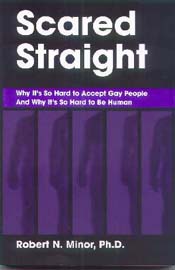 Robert Minor: That's a great question, but even as a historian, I'm not sure of the answer. I believe that progress is being made in spite of the politicians and many of our national leaders. I have the sense that we are in that part of the drama where the last throes of the beast are taking place.
Robert Minor: That's a great question, but even as a historian, I'm not sure of the answer. I believe that progress is being made in spite of the politicians and many of our national leaders. I have the sense that we are in that part of the drama where the last throes of the beast are taking place.
It's like the movie monster that the hero has slain raising up one more time with one more, potentially deadly and crucially important, swipe of its tail or jaws. The right wing is acting like a rat that's been cornered. It knows it's losing. It hopes for the second coming to save it. And it's pulling out all its stops to save itself. This is the most important point in the drama. It's not the time for us to turn our backs and believe it's over. It's also the time for everyday people to lead, not our heroes or national leaders who have some stake in things not changing too radically. Raj Ayyar: You have a very different perspective on gender, on how we are conditioned in childhood to behave in certain ways to prove our manhood or womanhood. Why is this conditioning such a focal point in your approach to society's sicknesses? Robert Minor: Gender is the issue as I see it. Trans people today embody the issue more than anyone else. They are the picture of how gender is tentative, socially constructed, and malleable. That's why we need them out and proud and need to champion their struggles. But the issue is really the expectations, pressures, definitions, and violence inherent in our definition of masculinity. Our culture is still a warrior culture that takes little boys and turns them, through what I believe is mental and psychological abuse, into warriors. Girls are turned into a warrior support system to serve the warriors. We just can't get away from war as our answer to every social, political, and international problem. If we can crack manhood, we'll leave the world a better place. So gay men who try to live that role (straight-acting, straight-looking), and criticize those who don't, might as well join the warrior society and go off to kill other men and be killed by other men in the name of manhood and for a sick system. Raj Ayyar: There are many people, both straight and gay, who've been taught that it is imperative that they establish long-term romances, or love-affairs, and that if they don't they are failures. This often gives them a feeling of desperation when they try to succeed. What do you have to say to them? Robert Minor: I'm convinced that psychologist, addiction specialist, and author Ann Wilson Schaef is right on when she talks about romance addictions and relationship addictions and says these are built into our society. As long as people are taught, believe, and act on the message that a relationship will save them from their loneliness, meaninglessness, and sadness, they'll need a relationship and won't be prepared to love in the way that love involves free choices and not desperate neediness. Again, these addictions, like all addictions, make money for our society, so they're as mainstream as anything. This is an example of buying into our larger society's sick institutions and then coping with its sickness. Raj Ayyar: I chuckled about the way you've described religion-peddling in your book: by door-to-door pamphleteers who appear as if out of a comic strip, saying: "We're from the church down the street and we'd like to quote the Bible and make you feel like dirt." Do you think current-day religions promote more than their share of society's sicknesses? Does the so-called Christian doctrine of Original Sin, for example, help to destroy self-esteem?
In order to be successful, they have to support society's other institutions. Religious positions that don't are marginalized until they do. In a war, for example, the traditional peace churches learn that they had better be supportive in some way ("We support our troops!") or they will be (and have been, but we are taught to forget) treated with violence, threats, ridicule, and rejection. Raj Ayyar: It's been five years since Matthew Shepard was murdered. There's been a film made to which you allude, about Laramie, Wyoming and the prejudices and attitudes of its people. Do you think that Matthew could have been murdered in Anytown, USA? Robert Minor: In short, yes. Denial doesn't help. Moving to Castro, Dupont Circle, or any other ghetto has not proven to be the end of anti-gay violence. Look at the attacks on LGBT people in San Francisco and D.C. for example. Look at the attempts in California too to curtail LGBT rights. We take our fears with us wherever we go. We are still a highly homophobic society that at times tolerates LGBT people. It sometimes takes those who tolerate us a real jolt to see that tolerance is not enough. And the sad thing is that many LGBT people, particularly those who have "made it" professionally or economically are tolerating LGBT people too. Raj Ayyar: Thank you, Dr. Minor. It's a delight sharing these thoughts with you. Is there anything else you'd like to tell our readers about why you've written Gay and Healthy in a Sick Society? Robert Minor: Thank you for the interview and the opportunity. There is so much more to be said. I'm ready for dialogue with my readers on these issues. That's the greatest thing about the response to my book Scared Straight: Why It's So Hard to Accept Gay People and Why It's So Hard to Be Human. It's the people I've met and how much I've learned from the people I've met. As I tell people, take from what I write what works for you and just let the rest go. I don't assume I'm original or profound. I just want to continue to speak up. I have so strong a belief that LGBT people are fine and that society is the real problem. It's critically ill. LGBT people, if they fight for their full humanity and don't settle, can be prophets, pointing the way to a healthy society. I wish all LGBT people just believed that about themselves. |
|
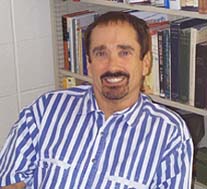 Dr. Robert N. Minor in his office at the University of Kansas
Dr. Robert N. Minor in his office at the University of Kansas 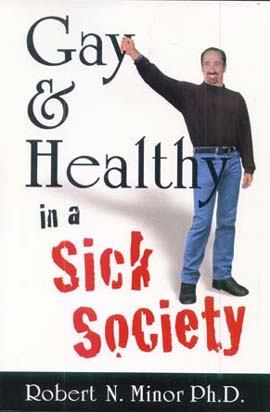 Raj Ayyar: Part of your title "Gay and Healthy" is reminiscent of Dr. George Weinberg's groundbreaking 1972 book Society and the Healthy Homosexual. Dr. Weinberg coined the term "homophobia" which he defined in that book. Your new book, Gay and Healthy in a Sick Society spends no time at all, however, concerning itself with the now-moot question of homosexuality as a sickness. One of your chapter titles notes that "The Psychological Debate is Over." We've come a long way since 1972 and your work therefore takes a very different tack, namely that it's today's society that's full of the real sicknesses and that our LGBT communities must carefully avoid them, whatever they may be. Is that fair to say?
Raj Ayyar: Part of your title "Gay and Healthy" is reminiscent of Dr. George Weinberg's groundbreaking 1972 book Society and the Healthy Homosexual. Dr. Weinberg coined the term "homophobia" which he defined in that book. Your new book, Gay and Healthy in a Sick Society spends no time at all, however, concerning itself with the now-moot question of homosexuality as a sickness. One of your chapter titles notes that "The Psychological Debate is Over." We've come a long way since 1972 and your work therefore takes a very different tack, namely that it's today's society that's full of the real sicknesses and that our LGBT communities must carefully avoid them, whatever they may be. Is that fair to say?
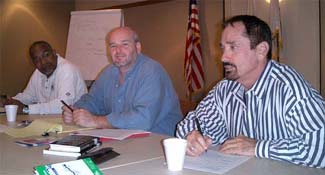 Bob Minor (right) with Professor Whitney Harris (far left, member of the Board of the Directors of the American Men's Studies Association) and
Professor Mark Justad (President of the AMSA Board)
Bob Minor (right) with Professor Whitney Harris (far left, member of the Board of the Directors of the American Men's Studies Association) and
Professor Mark Justad (President of the AMSA Board) 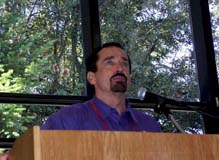 Dr. Robert Minor as keynote speaker, 2003 Washington State PFLAG Conference in September, 2003
Dr. Robert Minor as keynote speaker, 2003 Washington State PFLAG Conference in September, 2003 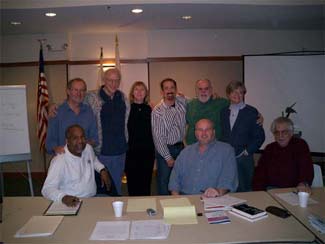 Dr. Robert Minor is a member of the board of the American Men's Studies Association
Dr. Robert Minor is a member of the board of the American Men's Studies Association